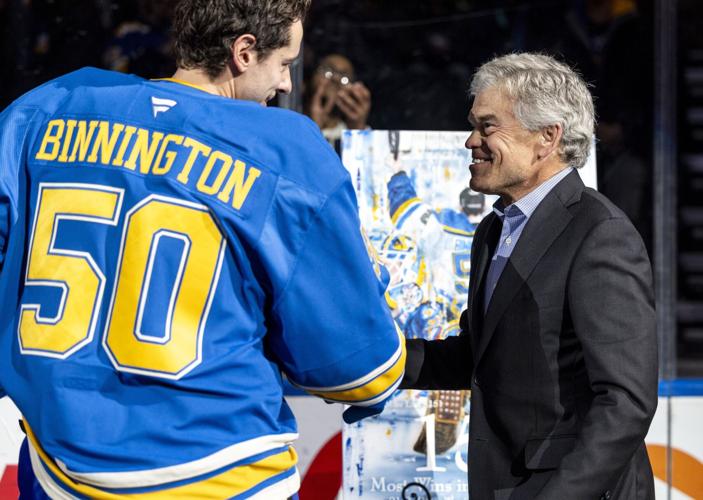
Blues Chairman Tom Stillman congratulates goaltender Jordan Binnington on setting the franchise record for wins before the Blues took on the Flyers on Saturday, Nov. 30, 2024, at Enterprise Center.
Last summer offered Blues ownership, including Chairman Tom Stillman, a choice.
The club had missed the playoffs two seasons in a row and, for the first time in a bit, wasn’t facing a cap crunch like they had as a contending team. So the option was there for Blues ownership to not spend all the way to the top of the salary cap.
But the Blues still did. It’s what allowed the front office to poach Philip Broberg and Dylan Holloway from Edmonton with offer sheets. It’s what allowed the club to acquire Cam Fowler, even exceeding the cap thanks to Torey Krug’s status on long-term injured reserve. Even in firing Drew Bannister and hiring Jim Montgomery, the Blues agreed to pay multiple head coach salaries simultaneously (Bannister’s contract was for two years).
So the checkbook remained open during a period of transition, allowing Doug Armstrong to drastically alter the look of his roster and setting up the Blues to return to the postseason for the first time since 2022.
People are also reading…
As the Blues approach another offseason, and with a league-wide increase in the salary cap, we can revisit last summer’s decision to spend money.
“As we’ve said, we want to do this re-whatever, but we wanted to remain competitive,” Stillman said in an interview with the Post-Dispatch. “Why do you want to remain competitive? One, because we’re competitive people. But also we feel like we owe it to our fans to put on the ice a competitive team, as competitive as we can at that stage. Beyond that, we want our young players learning, growing up in a positive competitive environment with leaders who are showing them how to win, how to be pros.”
After the 4 Nations Face-Off in mid-February, the Blues were the best team in the NHL, going 19-4-3 to claim the second wild-card spot in the Western Conference. That included a franchise-record 12-game win streak and wins in their last 15 games at Enterprise Center, including the first round vs. Winnipeg.
The Blues came within seconds of knocking off the Jets in the first round but blew a late two-goal lead in the third period of Game 7, then lost in double-overtime.
“If I think about the last parts of Game 7, it still hits,” Stillman said. “But overall, choosing to take a positive view of the season. I think we really took big steps forward, more than a lot of people maybe expected we would in one season. Overall, it was a good season and sets us up well for the future.”
When the Blues opened training camp last fall, Armstrong indicated that the organization had turned the page in their retool, changing from stockpiling talent in the pipeline to winning games on the ice. That mindset helped contribute to the big swings the organization took on Montgomery and Fowler. And the proof of a playoff appearance helped validate the team’s approach to a quick turnaround instead of tanking for high picks.

Blues forward Pavel Buchnevich, center, celebrates his second goal in the first period with teammates Robert Thomas and Cam Fowler during the first period of Game 3 of their Stanley Cup playoffs series against the Jets on Thursday, April 24, 2025, at Enterprise Center.
“One of the downsides of the complete teardown type of rebuild is that your young players end up in a losing culture for quite a while,” Stillman said. “They’re not learning how to win; they’re learning how to lose. I think even if you pick up lots of great prospects, it’s not always easy to shake that. We want our young guys in that positive winning environment and developing and learning from that winning culture.”
Stillman described it as “a culture of much more team-oriented, playing for each other, playing for the team, high energy at all times, all those things. That reflected some great work by all.”
The Blues enter this offseason in a more precarious situation. It’s almost guaranteed that their payroll will hover around the $95.5 million salary cap, in part due to raises for Pavel Buchnevich (now a $8 million cap hit) and Jake Neighbours ($3.75 million cap hit), plus a new contract for backup goalie Joel Hofer.
Then the cap will rise at least another $8.5 million to $104 million in 2026-27, and a minimum of $9.5 million to $113.5 million in 2027-28.
Will the Blues still spend to the cap with those big jumps?
“We’re going to do what we have to do to be competitive,” Stillman said. “We’re not going to say we have to spend to the cap because we have to make that statement. But we’ll spend to the cap if that’s what it takes to achieve our goals.
“Those goals include, most importantly, a goal of getting back to being a true contender. That remains a process. As we go into the active period of this offseason, we’ll be looking at: What is going to set us up best for success? Being competitive now and, to me even more importantly, to be a contender and truly have a chance to win the Cup in the future.”
















